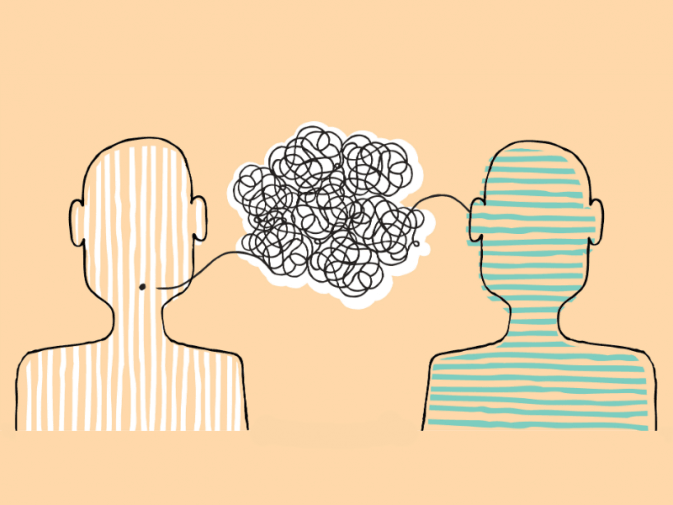Lancelot: Your rage has unbalanced you. You, sir, would fight to the death, against a knight who is not your enemy. Over a stretch of road you could easily ride around.
Arthur: So be it. To the death!
Question #1: How many times in your life have you lost a friend because one of you malevolently decided to hurt the other?
Question #2: How many times in your life have you lost a friend over a misunderstanding?
I am glad to report that I have lost few friends in my life. But as far as I can tell, all of the rare exceptions were driven by misunderstandings. Someone spoke rashly, which hurt someone’s feelings, which led to retaliation, which led to more hurt feelings, and so on. Or, someone acted as they thought proper, but someone else perceived otherwise, which led to offense, which led to counter-offense. The same goes for all the people I know well. They’ve lost many friends, but years later they flounder to explain the casus belli.
Is my corner of the world unusually free of sheer evil? Probably. Still, I doubt my experience is unusual. I bet that most readers have lost at least five times as many friends to misunderstandings as they have to malevolence.
How can you tell the difference between malevolence and misunderstanding? Try this a helpful thought experiment. Imagine both sides calmly describe what they saw with their own eyes and heard with their own ears to a neutral outsider. If the outsider would tell both sides to forget the dispute and stay friends, you had a misunderstanding. If the outsider would say, “This is a bad match,” you still had a misunderstanding; just one that’s likely to recur. But if the outsider would tell one of you, “Get away from this toxic person,” you saw – or were – malevolence.*
Why appeal to “neutral outsiders”? Well, the main reason misunderstandings arise is because most human beings rush to assume malevolence. Indeed, this is built into the very concept of the “misunderstanding”! Sure, I sometimes speak rashly. Sure, I’m no mind reader. When my friends speak rashly to me, or fail to understand my feelings, however, the default explanation is not that they spoke hastily or failed to see the world from my perspective. The default explanation is that they consciously decided to make me suffer.
Yes, it’s childish to think this way. But what can I say? People are childish.
Small example: Friday I was shopping with my sons. My back was hurting, so they were pushing the cart. When I got in line, a women immediately pulled up her cart behind me. By this point, my sons were ten feet away. When I asked her to make room for our cart, she grew angry: “Well that’s strange!” Even my highly visible back brace was not enough to make her wonder about my situation. When I meekly got out of the way and offered to let her go ahead of me, she huffed and moved to the next lane. To me, this was a textbook example of a misunderstanding. Still, I suspect she went home and told her family about how awful I was. I made the effort to understand where she was coming from, but somehow she gazed into the heart of a total stranger and saw malevolence.
You could object, “Yours is hardly an original point. Parents and teachers routinely alert children to the risk of misunderstandings.” Fair enough. My claim, however, is that this lesson rarely sinks in. Adults remain prone to misinterpret mere misunderstandings as malevolence. Indeed, there are mighty social and political movements that angrily strive to amplify this error – to ascribe malevolence recklessly, and demean those to ask us to mimic the perspective of a neutral outsider when conflict arises.
These days, the Me Too movement is the highest-profile example. When you carefully listen to the public accusations, their severity varies tremendously. The case of Bill Cosby is light-years from the cases of Louie C.K. or Aziz Ansari. Is it possible that the latter two celebrities were involved in misunderstandings that bizarrely became national crises? Entirely possible. But most Me Too activists don’t just gloss over this possibility; they view those who muse, “Maybe it’s all a big misunderstanding” with hostility. At risk of creating a new misunderstanding, my reaction to most Me Too scandals is precisely, “Maybe it’s all a big misunderstanding.” Indeed, I maintain that we should presume that conflicts are misunderstandings in the absence of strong evidence to the contrary.
How far should we apply this insight? Far indeed. Even tiny slights, uncharitably interpreted, often spiral out of control. So let us assess behavior with perspective and charity. Much conflict between Democrats and Republicans rests on misunderstandings. Much of the conflict between Black Lives Matter and Blue Lives Matter conflict rests on misunderstandings. So does much of the Israeli-Palestinian conflict. Indeed, part of the reason why I’m a pacifist that so many international conflicts are plainly rooted in misunderstandings. (If you can’t wait to scoff, “So the Nazis just had a big misunderstanding with the rest of Europe?,” you are fostering a misunderstanding between us. Over a stretch of road you could easily ride around).
If we fully accepted the prevalence of misunderstandings, couldn’t a malevolent person take advantage of us? I’m afraid so. Fortunately, that’s a minor danger compared to the opposite mistake. Remember: When you lose a friend over a misunderstanding, you don’t merely mistreat a friend. You deprive yourself of friendship in a lonely world.
* A worse, but still tolerably good rule of thumb: If your own complaints against your former friend seem less compelling to you years later, you probably had a misunderstanding. If your complaints actually seem more compelling years later, malevolence is more plausible.




